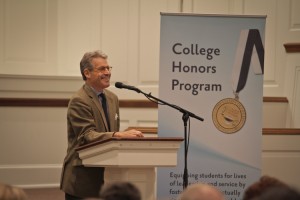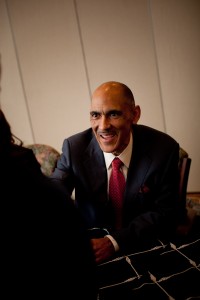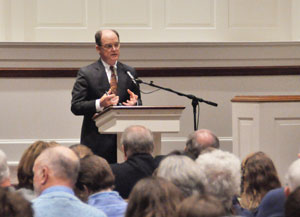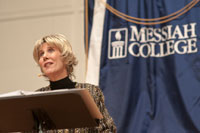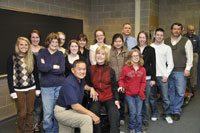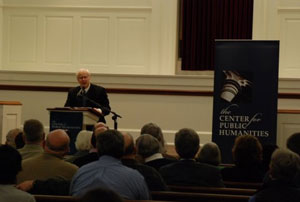
Jim Wallis, founder and CEO of Sojourners magazine, and Arthur Brooks, president of the American Enterprise Institute, engaged in an educational debate about the morality of capitalism on Nov. 9. The debate was a part of this year’s college lecture series, “To Change the World,” that explores the promise and challenge of being a faithful presence in contemporary society.
Peter Greer, the president and CEO of Hope International and ’97 Messiah graduate, introduced the evening’s debate to an audience of over 1,000 with a glimpse of the current state of our national economy. Greer described our country’s state of economic crisis in which our employment rate has reached 9 percent, and Occupy Wall Street demonstrators protest the fact that 24 percent of our nation’s wealth resides in the hands of the top 1 percent of Americans. Greer then recognized the market’s ability to open jobs to alleviate poverty.
Greer opened the floor for civil discourse which he described to be “as important as the topic we’re discussing.” He welcomed Wallis and Brooks, two prolific authors, professors, book writers and men of conviction, character and deep faith. Both presented their stance on the morality of capitalism before engaging in interactive debate.
“Is capitalism moral? Of course it isn’t,” Brooks boldly stated, momentarily lifting eyebrows of a surprised audience. “Only people are,” he explained. Brooks argued that people are moral creatures by design, and moral arguments beat material arguments every day. Economists forget this, but our nation’s founders knew it when they wrote the Declaration of Independence and chose to exclude the privilege to property in our unalienable rights, substituting it with the pursuit of happiness.
Brooks believes that the key to happiness is earned success, not money. He shared statistics that support this theory, stating that the number of people who report that they are happy hasn’t changed even though our nation and individuals have become massively richer over the last 40 years. Instead, people crave earned success, and capitalism is a system which supports that. “Free enterprise pairs people’s skills with passions,” Brooks explained. “It’s a system that rewards not envy, but aspiration.”
Jim Wallis, on the other hand, argued that our economy is “unfair, unstable and making people unhappy.”
“We come from a polarized, paralyzed society stuck in ideology,” Wallis began. “Ideology says ‘either or,’ but solutions say ‘and.’” He immediately encouraged the audience to open their minds to comprehensive solutions: “don’t go right, don’t go left, go deeper. This isn’t about winning a debate, but it’s about solving massive economic suffering.”
After sharing saddening statistics about the poverty in America, Wallis dug into the challenge of finding solutions to the problems in our market today. “We can’t just say it’s good business,” Wallis said. “Slavery was once good business. Human trafficking or cheating people on credit cards is good business.” Instead, the market needs a moral framework.
For us as Christians, this means first looking to the Bible. Wallis drew his answer from Matthew 25 where God will one day tell us, “Whatever you did for the least of these brothers and sisters of mine, you did for me.” Wallis explained that this is a judgment test to us as Christians, and he encouraged the audience to use Matthew 25 as their criteria for the evening’s economics conversation.
By adopting this title of “Matthew 25 Christians,” Wallis explains that we can break out of left and right and reach the poor. “Society is best judged of its righteousness or integrity by how it treats the poorest and most vulnerable,” Wallis said. “What do you do when the invisible hand lets go of the common good?”
Wallis proposed that Christians should “go to where the money is” in order to push for change and form a circle around the poorest and most vulnerable. “Are we ideologists or people who care about the metrics of the gospel?” Wallis challenged the audience.
Greer stepped in and questioned Brooks on how he responds to a system “that has potential to let go of the hand of the common good?”
“We don’t need less capitalism; we need better capitalists,” Brooks answered. The problem according to Brooks is capitalism without accountability. “It’s not enough to earn your success and walk away,” Brooks said, arguing that this is the moral imperative of an opportunity society. Brooks suggests that good capitalists need to promote social mobility by promoting “education, faith, family and community.”
Wallis responded by arguing that we are in a different period now where inequality is so great and immediate help for the struggling poor is needed. Wallis agrees that economic development is the long term solution, but at this point for the poor, “it’s not dependency, it’s survival.” Wallis went back to the Bible to reference Jubilee, the Biblical practice of freeing people of their debts nationwide, and suggested that this is the “Biblical corrective for the sinful tendency of the market.”
Wallis and Brooks responded to final questions by discussing specific changes in legislation that would help solve the current economic crisis. Brooks proposed cuts in subsidies and entitlements, explaining the immorality of entitlements to reward workers without looking at their income. Wallis echoed Brooks’ suggestions and also proposed a cut in military spending and a raise in levels of taxable income.
While both Wallis and Brooks differed on viewpoints of the best way to do it, they both shared a genuine desire to be a Christian in today’s modern world. Greer closed the evening in prayer, and Brooks, Wallis and the audience in Brubaker auditorium came together in their desire to ask tough questions and seek God.
Watch video footage of the debate.
Story by Mary-Grace MacNeil `13.
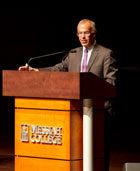 On October 3, Messiah College proudly welcomed New York Times journalist and PBS NewsHour commentator David Brooks to address “The Importance of Humility and Civil Discourse in American Life.” Brooks currently acts as an op-ed columnist at the Times, a position which allows him to explore the various aspects of politics, culture and society. In addition to his success at the Times and on the air, the celebrated columnist has also gained widespread recognition as an author with the release of his books “The Social Animal: The Hidden Sources of Love, Character and Achievement,” “On Paradise Drive,” and New York Times best-seller “Bobos in Paradise.” (more…)
On October 3, Messiah College proudly welcomed New York Times journalist and PBS NewsHour commentator David Brooks to address “The Importance of Humility and Civil Discourse in American Life.” Brooks currently acts as an op-ed columnist at the Times, a position which allows him to explore the various aspects of politics, culture and society. In addition to his success at the Times and on the air, the celebrated columnist has also gained widespread recognition as an author with the release of his books “The Social Animal: The Hidden Sources of Love, Character and Achievement,” “On Paradise Drive,” and New York Times best-seller “Bobos in Paradise.” (more…)
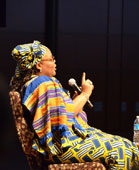 Few were more suited to conclude Messiah’s yearlong lecture series, “Courage and Conviction for Challenging Times” than Leymah Gbowee, a woman whose personal courage, conviction and commitment to community-building played a pivotal role in ending Liberia’s civil war and in enabling Liberian women to become educated, empowered agents of peace and reconciliation.
Few were more suited to conclude Messiah’s yearlong lecture series, “Courage and Conviction for Challenging Times” than Leymah Gbowee, a woman whose personal courage, conviction and commitment to community-building played a pivotal role in ending Liberia’s civil war and in enabling Liberian women to become educated, empowered agents of peace and reconciliation.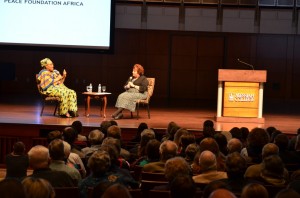 “Conviction opened a doorway for courage,” Gbowee recalled about the efforts of the Mass Action for Peace. Five women initially felt convicted to action. Soon the effort was 10,000 women strong. The boldness of these women to confront and forgive the soldiers who had raided their villages, pillaged their homes and raped them and their children is barely comprehensible.
“Conviction opened a doorway for courage,” Gbowee recalled about the efforts of the Mass Action for Peace. Five women initially felt convicted to action. Soon the effort was 10,000 women strong. The boldness of these women to confront and forgive the soldiers who had raided their villages, pillaged their homes and raped them and their children is barely comprehensible.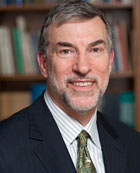 On February 21, Messiah College warmly welcomed Geoffrey Galt Harpham as the keynote speaker for the College’s annual
On February 21, Messiah College warmly welcomed Geoffrey Galt Harpham as the keynote speaker for the College’s annual 